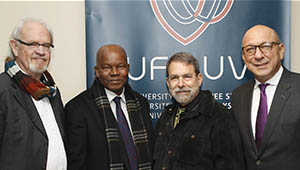Latest News Archive
Please select Category, Year, and then Month to display items
06 April 2018
Photo Rulanzen Martin
 From the left: Dr Thulisile Mphambukeli, leader of the BRICS research team that is exploring the political economy of water and food security, and her research partner, Dr Victor Okorie.
From the left: Dr Thulisile Mphambukeli, leader of the BRICS research team that is exploring the political economy of water and food security, and her research partner, Dr Victor Okorie.
A Brazil, Russia, India, China and South Africa (BRICS) delegation is to hold the 10th Annual BRICS Summit in the last week of May 2018 in Johannesburg. Dr Thulisile Mphambukeli, leader of the University of the Free State (UFS) research team alongside Dr Victor Okorie from the Department of Urban and Regional Planning, in collaboration with Prof Lere Amusan of North-West University, will ensure that water and food security is a prominent feature on the gathering’s agenda.
First, the project titled: “Exploring the political economy of water and food security nexus in BRICS and Africa” will debut at the National Institute for the Humanities and Social Sciences BRICS Think Tank Forum”.
According to Dr Mphambukeli, the key to water security is attitudinal change by means of education and conscientisation. This, she is adamant about, holds the potential to drive behavioural adjustments in the way society interacts with water.
Genetic and social approaches
Dr Okorie asserts that if strides towards reducing the demand for water were to be made, research efforts should be geared towards effecting changes at DNA level. Meaning we need to explore waterwise ways that enable crops and animals to thrive optimally.
The project also looks at social dimensions of water such as flushing a toilet. “Research activities on redesigning toilets, especially the urinal, where more than nine litres of water are used to flush less than one cubic centimetre of urine, are timely in the context of managing water and the food nexus crises,” said Dr Okorie.
Combining the genetic and social approaches would allow us to produce more with a smaller water footprint. This can be made possible by implementing precision agriculture which is about estimating and applying exact quantities of water and nutrients needed for the production of crops or the raising of livestock.
Paradigm shifting policies
Prof Amusan said the team intended to propose functional solutions that take the quality of water into consideration. Equitable production and distribution of water depends on endorsing policies of co-production between citizens, governments and the public sector. BRICS member states mutually consider water and food security as an issue of paramount significance, hence its feature on this prestigious summit’s agenda.
Trevor Manuel and Max du Preez among the recipients of honorary doctorates at UFS graduation
2016-07-02
 The UFS awarded four honorary doctorates
The UFS awarded four honorary doctorates
at its Winter Graduation ceremonies.
The recipients are from left Max du Preez,
Dr Reuel Jethro Khoza, Prof Joel Samoff
and Trevor Manuel at the UFS Chancellor’s
Dinner on 30 June 2016. Photo: Johan Roux
He is excited about the young minds he saw and interacted with at the graduation ceremony of the University of the Free State (UFS). This is what Max du Preez, one of South Africa’s leading journalists and political analysts, said after receiving an honorary doctorate.
According to Du Preez (Humanities), he was inspired by the Winter Graduation ceremony on 30 June 2016 in the Callie Human Centre on the Bloemfontein Campus. He is happy to finally also call the UFS his alma mater. He grew up in Kroonstad and is a true Free Stater, but previously graduated at the Stellenbosch University.
The UFS awarded four honorary doctorates – the others to Prof Joel Samoff (Humanities), Trevor Manuel and Dr Reuel Jethro Khoza (both Economic and Management Sciences) – and two Chancellor’s medals at the morning ceremony on 30 June 2016. Chancellor’s medals were awarded to Antony Osler and Marguerite van der Merwe (née Osler).
Manuel impressed by amount of soul
At the Chancellor’s Dinner, which was held in the Centenary Complex on the Bloemfontein Campus on 30 June 2016, Du Preez said he feels honoured. He said South Africans must embrace the diversity of the country, and the UFS is a good example. “If the University of the Free State can make it, South Africa can make it.”
Manuel, a former South African Finance Minister, said he is honoured by the amount of soul he experienced from Dr Khotso Mokhele, UFS Chancellor, and Prof Jonathan Jansen, Vice-Chancellor and Rector of the UFS. “We cannot tolerate what is wrong (in the country) and need to push the boundaries of what is right,” he said.
UFS stands out regarding understanding
Dr Khoza, a distinguished thinker and businessman, also thanked the UFS at the Chancellor’s Dinner. “We shall strive to be known less for what we say, but rather more for what we do,” he said about the country.
According to Prof Samoff, Professor in Africa Studies at Stanford University (USA), “South Africa has committed itself to building a democratic, non-racist, and non-sexist society”. “Where the University of the Free State stands out, is in its understanding that societal change – ‘transformation’, to use the current terminology – is not an outcome, but a process. A difficult process.”
Media Enquiries
Contact person: Lacea Loader (Director: Communication and Brand Management)
Tel: +27(0)51 401 3422/2707 or +27(0)83 645 2454
Email: news@ufs.ac.za | loaderl@ufs.ac.za
Fax: +27(0)51 444 6393